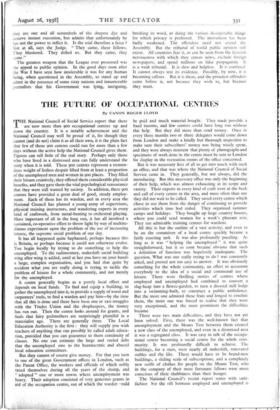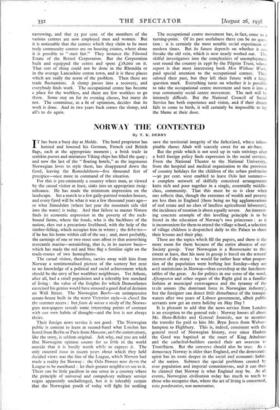THE FUTURE OF OCCUPATIONAL CENTRES
By CANON ROGER LLOYD
THE National Council of Social Service report that there are now more than goo occupational centres up and down the country. It is a notable achievement and the National Council may well be proud of it, for though they cannot (and do not) claim it as all their own, it is the plain fact that few of those 90o centres could run for more than a few days without the active help the National Council gives them. Figures can tell little of the real story. Perhaps only those who have lived in a distressed area can fully understand the story when it is told. These goo centres represent a tremen- dous weight of listless despair lifted from at least a proportion of the unemployed men and women in goo places. They filled their leisure creatively, they offered them considerable physical benefits, and they gave them the vital psychological reassurance that they were still wanted by society. In addition, these goo centres have provided a great deal of good, steady employ- ment. Each of them has its warden, and in every area the National Council has planted a young army of supervisors, physical training instructors, and wandering experts in every kind of craftwork, from metal-beating to orchestral playing. Most important of all in the long run, it has all involved a sustained, co-operative effort to throw light by way of multitu- dinous experiment upon the problem of the use of increasing leisure, the supreme social problem of our day.
It has all happened quite haphazard, perhaps because this is Britain, or perhaps because it could not otherwise evolve. You begin locally by trying to do something to help the unemployed. To the rudimentary, makeshift social building wing after wing is added, until at last you have on your hands a large, complex organisation, and you find that quite by accident what you are really doing is trying to tackle the problem of leisure for a whole community, and not merely for the unemployed.
A centre generally begins as a purely local effort and depends on local funds. To find and equip a building, to gather the unemployed into it, to provide a supply of wood and carpenters' tools, to find a warden and pay him—by the time that all this is done and there have been one or two struggles with the Trades Union and the shopkeepers, the money has run out. Then the centre looks around for grants, and finds that fairy godmothers are surprisingly plentiful in a materialist age. There are generally three. The Local Education Authority is the first : they will supply you with teachers of anything that can possibly be called adult educa- tion, provided that you can guarantee to them continuity of classes. No one can estimate the large and varied debt that the unemployed owe to the bureaucratic and abused local education committees.
But they cannot of course give money. For that you turn to one of the great Government offices in London, such as the Patent Office, the workers and officials of which nobly taxed themselves during all the years of the slump, and " adopted " one or more towns where unemployment was heavy. Their adoption consisted of very generous grants in aid of the occupation centre, out of which the warden could be paid and much material bought. They made possible a fixed income, and few centres could have long run without this help. But they did more than send money. Once in every three months two or three delegates would come down from London and make a kindly but thorough inspection to make sure their subscribers' money was being wisely spent, and they were always insistent that plenty of photographs and specimens of work done in the centre must be sent to London for display in the recreation rooms of the office concerned.
But it was necessary first of all to get into touch with such an office, and that was where the National Council of Social Service came in. They generally, but not always, did the introducing. But this necessary office was only the beginning of their help, which was almost exhausting in its scope and variety. Their experts in every kind of craft were at the beck and call of every centre in the area, and more often than not they did not wait to be called. They saved every centre which chose to use them from the danger of continuing to provide activities which time had staled. They organised summer camps and holidays. They bought up large country houses, where you could send women for a week's pleasant rest. They ran admirable training centres for wardens.
All this is but the outline of a vast activity, and even to be on the committee of a local centre quickly became a fairly exacting task. It was also profoundly puzzling. As long as it was " helping the unemployed " it was quite straightforward, but it so soon became obvious that such a definition of function was hopelessly inadequate. The question, What was one really trying to do ? was constantly asked, and proved not too easy to answer. It was obviously something for the whole community, an effort to accustom everybody to the idea of a social and communal use of leisure. There were thrilling stories of centres where employed and unemployed had combined to convert a slag-heap into a flower-garden, to turn a disused mill lodge into a swimming-bath, to construct a public ambulance. But the more one admired these feats and longed to emulate them, the more one was forced to realise that they were very exceptional, and the more prominent the difficulties became.
There were two main difficulties, and they have not yet been solved. First, there was the well-known fact that unemployment and the Means Test between them created a new class of the unemployed, and even in a distressed area it was a segregated class. It was easy to talk of the occupa- tional centre becoming a social centre for the whole com- munity. It was profoundly difficult to achieve. The buildings, for a start, were nearly all makeshift, renovated stables and the like. There would have to be brand-new buildings, a sliding scale of subscriptions, and a completely new outfit of clothes for people on the Means Test, who in the company of their more fortunate fellows were more conscious of their shabbiness than their hunger.
The National Council's recent report states with satis- faetion bnt the rift between employed and unemployed is narrowing, and that 25 per cent. of the members Of the various centres are now employed men and women. &it it is noticeable that the centres which they claim tc be most truly community centres are on housing estates, where alone it is possible to " start fair." They instance the Filwood Estate of the Bristol Corporation. But the Corporation built and equipped the centre and spent £18,00o on it. That sort of thing could not be done in the Rhondda or in the average Lancashire cotton town, and it is these places which are really the norm of the problem. Then there are trade fluctuations. A slump passes into a recovery, and everybody finds work. The occupational centre has become a place for the workless, and there are few workless to go there. Some stay on for its evening classes, but many do not. The committee, in a fit of optimism, decides that its work is done. And in two years back comes the slump, and all's to do again. The occupational centre movement has, in fact, come to a turning-point. Of its past usefulness there can be no ques- tion : it is certainly the most notable social experiment of modern times. But its future depends on whether it can forsake the old vein, which is now nearly worked out. The skilful investigators into the complexities of unemployment sent round the country in 1936 by the Pilgrim Trust, -whose report is that most interesting book Men Without Work, paid special attention to the occupational centres. They saluted their past, but they left their future with a large question mark. Everything turns on whether it is possible to take the occupational centre movement and turn it into a true community social centre movement. The task will be intensely difficult. But the National Council of Social Service has both experience and vision, and if their dream fails to come to birth, it will certainly be impossible to lay the blame at their door.



































 Previous page
Previous page